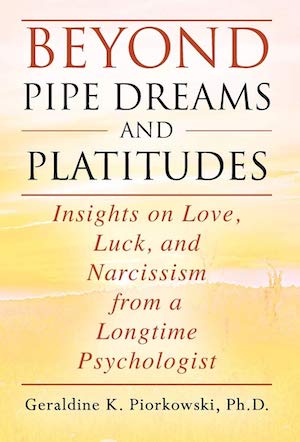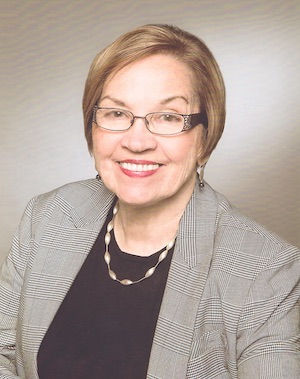By Skyler Aikerson
Throughout her 50-plus year long career as a psychologist, Geraldine K. Piorkowski worked with a variety of clients, from couples to young children, and in many different settings, from Illinois’ Shirley Ryan Ability Lab to New Jersey’s College of Medicine and Dentistry (now Rutgers School of Biomedical and Health Sciences). After she retired in 2017 and reflected on her career, she found that people are more or less the same, with the same needs, desires, and fears. Instead, she wanted to uncover “provocative issues that are not readily apparent in the culture at large,” she said.
With this in mind, she set off on a three-year journey to writing her third book, Beyond Pipe Dreams and Platitudes: Insights on Love, Luck, and Narcissism from a Longtime Psychologist, released on October 9 by Outskirts Press.

With essay titles like “When Is Madness Better than Sadness?” and “Vulnerable People Are More Likable than Super-Confident Ones,” Beyond Pipe Dreams and Platitudes challenges popular notions about narcissism, empathy, and anger. In a chapter called “Positive Thinking Isn’t All It’s Cracked Up to Be,” she recounts the story of a client whose leg had recently been amputated. The client “initially said he was experiencing no sadness at the loss of his leg and that his friends and family were very supportive,” she observed. “But the following week, he experienced an impulse to jump out of the window. Obviously, his positive thinking about his amputation interfered with his resolving negative feelings that were just underneath the surface.”
It’s hard for Piorkowski to choose a favorite essay out of the eight in the collection, but the one she described as “the most detailed” is on romantic love. In this essay, titled “Romantic Love Is Mostly an Illusion,” Piorkowski explains that unless romantic love is buoyed by respect and commitment, it “quickly dissipates as you become aware of the other person and their reality.” This isn’t Piorkowski’s first foray into writing about love: her previous two books, Too Close for Comfort: Exploring the Risks of Intimacy (1994) and Adult Children of Divorce: Confused Love Seekers (2008) both looked at the topic.
Another essay, which she said is “the most eye-opening,” deals with luck and chance. While she doesn’t discount the importance of talent, in a society that places so much emphasis on hard work Piorkowski reminds readers that a significant part of success is simply being in the right place at the right time. “All you have to do is look at your own life and you see how many experiences you’ve had that are really a function of luck,” she said, using her experiences as a member on various university search committees as an example of how much of a role chance plays in situations like getting hired. “I don’t think we spend enough time talking about that, and as a result, people take too much credit for their successes and too much blame for their failures,” she added.
Piorkowski explained that her writing process is equal parts creativity and discipline. For this book, she composed the chapter titles first. Then she would carve out at least two-hour blocks every day for writing sessions. “The pandemic enabled me to finish it because I had a lot more time on my hands,” she said.
The retired psychologist has always had an interest in writing. In high school, she was the feature editor for her school’s newspaper, and in college, she waited until the day before she was required to declare her major because she was deciding between psychology and journalism. Questions about her own family, as well as about an older neighbor who, Piorkowski recalled, “kept cooking food for the man on the roof, though there was no such man,” tipped the scale in favor of psychology.
After completing her bachelor’s degree, she continued her studies at the University of Illinois at Urbana-Champaign, entering graduate school at a time when few women did so, and eventually earning her Ph.D. in 1964. “Graduate school was probably one of the best times in my life. It was really busy, but it was very, very stimulating and always challenging,” she said.
Phi Beta Kappa plays an important role in Piorkowski’s life. She is a board member of the Phi Beta Kappa Association of the Chicago Area and said the group’s book club is a “positive community group for interactions and friendships.” Before the pandemic, she’d help plan excursions around the city. (Now, all the group’s events are virtual.)
Piorkowski compared a liberal arts education to a prism, saying that it gives different lenses to view the world through. “It broadens your perspective on life,” she said. “The multifaceted perspective that [a liberal arts education] provides is invaluable.”
Skyler Aikerson earned her bachelor’s degree in psychology from Goucher College, where she was inducted into Phi Beta Kappa in May 2020. Goucher College is home to the Beta of Maryland chapter of Phi Beta Kappa.




